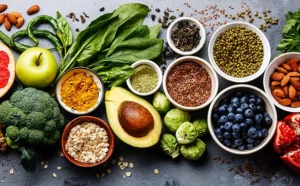While there is a wealth of information available about what to eat and how to do it, starting a healthier diet doesn’t have to be difficult. By making small, manageable changes to your diet, you can significantly improve your health. Here are some straightforward and helpful tips to get you started.
1. Pay attention to whole foods
Choosing whole foods like fruits, veggies, whole grains, lean meats, and healthy fats is one of the best ways to eat better. Whole foods have been prepared as little as possible and are full of nutrients that your body needs to work at its best.
Tip: Make sure you get a lot of different vitamins, minerals, and antioxidants by eating a lot of different colored fruits and veggies.
2. Keep an eye on the portions
You need to watch both what and how much you eat to be healthy. It’s easy to gain weight when you eat a lot, even if the food is good. To help you keep your portions in check, start by learning what the right size portions look like. You can also try using smaller plates.
Tip: Pay attention to when you’re hungry and try to eat until you’re full but not too full.
3. Make sure you eat a balanced diet
A healthy diet has a range of foods from all the food groups, such as grains, fruits and veggies, dairy (or dairy replacements), and protein sources. Each group gives you important nutrients that are good for your health as a whole. It’s important to think about eating in a broad way.
Note: To keep your energy level steady throughout the day, try to eat meals that have a good mix of protein, fiber, healthy fats, and carbs.
4. Eat less processed foods
A lot of processed foods have a lot of salt, sugar, and fats that are bad for you. It’s okay to eat these things once in a while, but try to limit how often you do so. Foods that are highly processed can make you gain weight, make inflammation worse, and raise your risk of getting chronic diseases.
Don’t eat artificial snacks as a snack. Instead, eat whole foods like fruits, vegetables, nuts, or seeds.
5. Drink a lot of water
A big part of eating healthy is staying wet. Water helps your body process food, keep your temperature stable, and support all of its functions. Folks often mistake thirst for hunger, which can cause them to eat too much.
Tip: Try to drink eight cups (64 ounces) of water every day. If you have trouble remembering things, try bringing a water bottle with you all day.
6. Pick fats that are good for you
There are different kinds of fats. You need healthy fats for your body, which you can find in avocado, olive oil, nuts, and fatty fish. They help your body receive some vitamins and keep your brain and heart healthy.
Tip: Instead of trans fats and saturated fats that you can find in processed snacks and fast food, choose fats that come from whole foods.
7. Eat more fiber
Fiber is important for digestion and can help keep cholesterol levels in a healthy range. Plus, it makes you feel fuller for longer, which helps you keep your weight in check. Fruits, veggies, whole grains, beans, and seeds are all high in fiber.
Tip: Try to eat a range of fiber-rich foods at each meal. For example, you could add berries to your oatmeal or lettuce to your salad.
8. Watch how much sugar you eat
Too much extra sugar can make you gain weight, cause inflammation, and raise your chance of getting illnesses like type 2 diabetes. It’s important to be aware of sugar that comes from both obvious places (like drinks and food) and less obvious places (like sauces and seasonings).
Tip: Instead of drinking sugary drinks, try drinking water or plant teas. Read the labels on foods to find sugars that are hidden in them.
9. Make plans for your meals
Planning your meals can help you eat better. If you plan your meals ahead of time, you’re less likely to eat something bad when you’re hungry. Making a plan also saves you time and money and makes sure you always have healthy food on hand.
Tip: Plan and prepare your meals once a week. It can save a lot of time to cook grains, meats, and veggies all at once.
10. Learn to eat with awareness
Mindful eating means focusing on the tastes of the food you’re eating and being aware of when your body tells you it’s hungry or full. This can help you feel better about food and stop you from eating too much.
It’s best to eat slowly and fully enjoy your food. Don’t let your phone or TV confuse you.
11. Don’t skip meals
If you skip meals, you might end up eating too much later because you’ll be too hungry and more likely to pick bad, quick foods. Having regular meals helps you stay energetic and keeps your body going.
Tip: To keep your energy level steady during the day, try to eat a healthy meal every three to four hours.
12. Make healthy changes little by little.
It can be hard to handle making big changes to your food. Start with small changes that you can handle and keep up over time. To start, you could add one more food to your meals every day or switch from white bread to whole grain bread.
Tip: Aim for growth instead of perfection. You should be proud of every little step you take toward better living.
13. Pay attention to your body
Each person has different food needs. Pay attention to how you feel after eating certain things. Do you have energy after eating a certain meal, or do you feel tired? Figure out what works best for you by paying attention to what your body is telling you.
As a food journaling tip, write down how you feel after eating different foods and look for trends.
In conclusion
Eating healthy doesn’t have to be hard or difficult. You can slowly improve your diet and health by eating more whole foods, watching your portions, drinking enough water, and paying attention to your body. First, make small changes. Remember that the key to long-term success is to make changes that last. Enjoy the process of giving your body what it needs and making choices that are good for you.




